#empire records soundtrack
Explore tagged Tumblr posts
Text
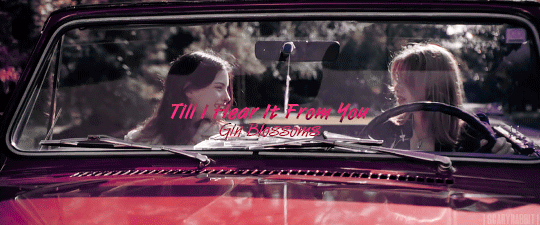
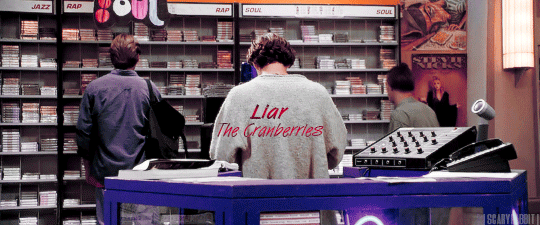

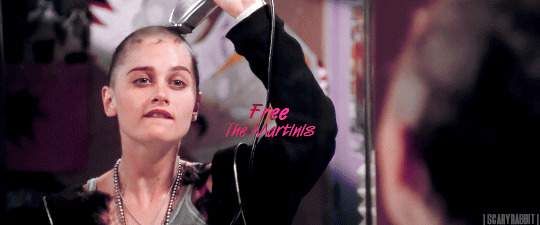
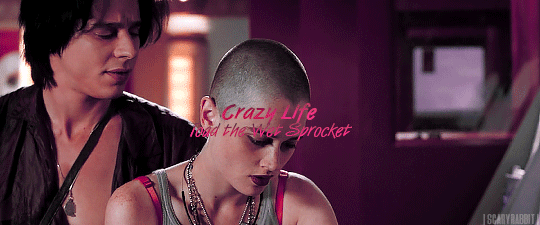



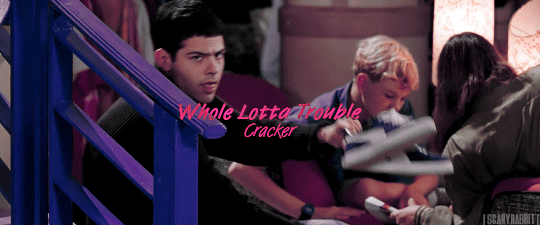
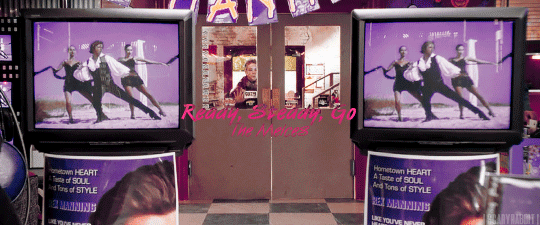

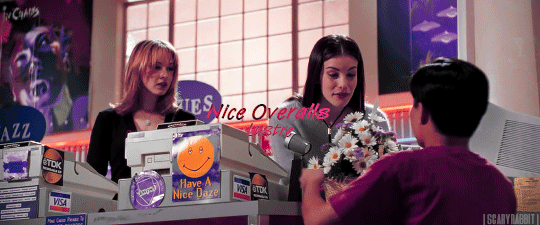
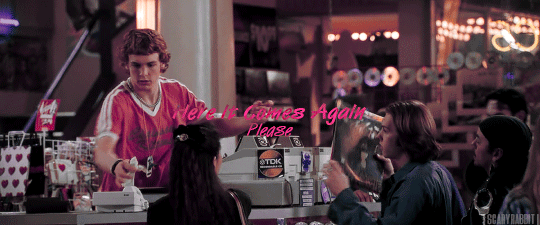
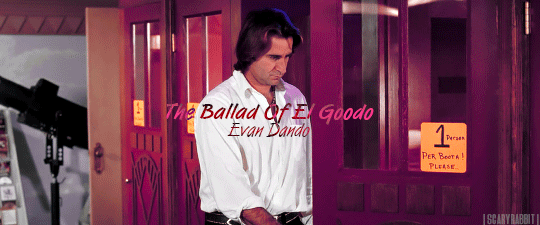

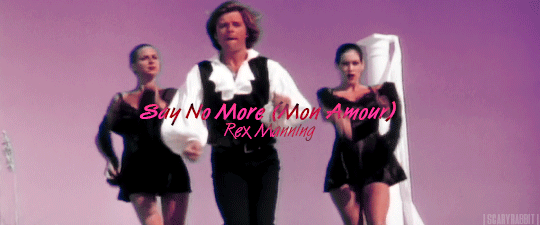
Empire Records (1995) | Soundtrack and Bonus
#empire records#empire records (1995)#empire records soundtrack#90s movies#cult film#90s nostalgia#90s music#anthony lapaglia#maxwell caulfield#rory cochrane#johnny whitworth#robin tunney#renée zellweger#renee zellweger#ethan embry#coyote shivers#brendan sexton iii#liv tyler#sillyrabbit81 gifs#scaryrabbit gifs#scaryrabbit movie gifs#filmedit
216 notes
·
View notes
Text

In the fateful words of the Doors, the time to hesitate is through
2 notes
·
View notes
Text

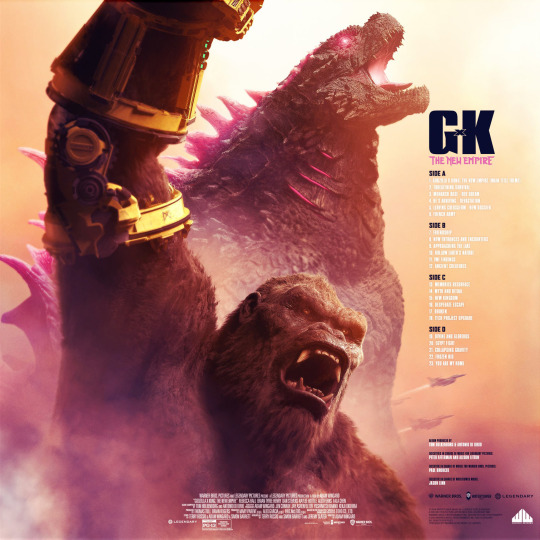


Godzilla x Kong: The New Empire's soundtrack is available on vinyl for $40 via Waxwork Records. The score is composed by Tom "Junkie XL" Holkenborg (Mad Max: Fury Road, Godzilla vs. Kong) and Antonio Di Iorio.
The 2xLP album is pressed on 180-gram colored vinyl. It's housed in a gatefold jacket with matte satin coating featuring layout and design by Matt Needle and a 12x12 art print. It's expected to ship in June.
#godzilla x kong: the new empire#godzilla x kong#godzilla x kong the new empire#godzilla#kong#king kong#waxwork records#vinyl#soundtrack#gift#junkie xl#tom holkenborg#antonio di iorio#monsterverse#matt needle
31 notes
·
View notes
Text
Sugar High - Empire Records - 1995
youtube
27 notes
·
View notes
Text
I feel so funny deep inside
When you kiss me goodbye...
🍬 Sugarhigh 🍭
💖
5 notes
·
View notes
Text
You can choose only 1

1 note
·
View note
Text
So Hozier just dropped an EP. Cool, love it, great as always. Now, when is he gonna officially drop But the Wages. Please, Andrew, I'll take a demo atp idc🙏
#sstfu.txt#I'll listen to that one shakey concert recording until the end of time if I have to but still#my opinion on first listen is I like too sweet a lot and empire now is giving video game soundtrack#the other too are just ok ehh#they'll probably grow on me all his songs usually do
1 note
·
View note
Text
I am not a records person but one of this year’s albums for record store day is Hello Mary Lou Prom Night 2 soundtrack???? I have a mighty need
0 notes
Text
WIP INTRO: NEON VIOLET

The light-leaks and scratches on the old film flicker over her face, masking her reflective white eyes. The video kicks back and loops. “My name is Nettie Schultz and I have died three times,” she repeats.
Blurb: On the island of Tombedel, no one dies. At least, no one stays dead.
After separating from his wife of over twenty years, London-based private investigator Abe Tannen visits the exclusive medieval island of Tombedel during their Saint Martin’s Day celebrations, but his much-needed vacation takes an unexpected turn when a man is murdered in his hotel: the first person to actually die on the island in over 1,000 years.
With the local law enforcement unprepared to handle a real murder, the investigation falls to Abe, who enlists the help of an eclectic group of ghosts.
When the investigation leads them to begin uncovering the island’s long-buried secrets, Abe and his team find themselves in far more danger than they could have anticipated. After all, there are far worse fates than death.
Setting: Tombedel, a mysterious medieval island off the coast of England. November of 2025, but also 1983 and 1934 and 802 AD and 509 AD.
Genre: Adult, sci-fi mystery
Series: 1 of 2
POV: 3rd person present tense, multi-pov
Vibes: glitter-smudged faces, foggy coasts, chainmail under t-shirts, crystal balls, ancient church towers, neon lights, dimly lit labs, tape recorders, ren faires, crumbling castles, rundown pubs, cable-knit sweaters, old magicks.
Soundtrack: Seventeen Going Under - Sam Fender / I'm Set Free - The Velvet Underground / Night Shift - Lucy Dacus / The Body Electric - Hurray for the Riff Raff / Yuri-G - PJ Harvey / My Darling Faye - Songs for Moms / Vampire Empire - Big Thief / The Killing Moon - Echo & the Bunnymen
Word Count: Planning
#neon violet#wip#wip intro#work in progress#mystery#detective#writer community#writers on tumblr#writing#writeblr#writeblr intro#ghosts#medieval#historical fantasy#this is such a funky project#i'm having a lot of fun!!
30 notes
·
View notes
Text
Trent Reznor and Atticus Ross have a plan to soundtrack everything
Trent Reznor and Atticus Ross – best friends and Nine Inch Nails bandmates – found unlikely creative fulfilment (and a couple of Oscars) by reassessing what they had to offer as musicians. Now they’re thinking even bigger, and imagining an artistic empire of their own making
By Zach Baron
Photography by Danielle Levitt
Every weekday, Trent Reznor makes his way from his house, a cottagey sprawl behind a white wall in a canyon on Los Angeles’s Westside, to a studio he’s built in his backyard. There he meets his best friend, bandmate, and business partner, Atticus Ross, and they get to work. Reznor and Ross observe the same hours, Monday to Friday, 11am to 7pm. “We show up,” Reznor told me. “We’re not late. We’re not coming in to start to fuck around.” It’s a methodical, orderly existence that Reznor could not have foreseen in the ’90s, when he was fronting Nine Inch Nails and struggling with a drug-and-alcohol problem that was his answer to success. “I would do anything to avoid writing a song,” Reznor said. “I’d rewire the studio 50 times.”
Now Reznor has a wife, Mariqueen Maandig, five children, and multiple jobs. He is sober. Since 2010, when the director David Fincher asked Reznor and Ross to score The Social Network, for which Reznor and Ross won an Oscar, the two men have had steady employment composing for film. This year, Reznor and Ross are also starting a yet-to-be-named company, built around storytelling in multiple disciplines: film production, fashion, a music festival, and a venture with Epic Games.
And then, of course, there is the oldest and perhaps still the most complicated of Reznor’s jobs: being the frontman of Nine Inch Nails. In 1988 Reznor formed what was then a one-man band; the first two full-length records Nine Inch Nails released, Pretty Hate Machine(1989) and The Downward Spiral (1994), have sold more than eight million copies. (Over subsequent years and subsequent albums, the band has since crossed the 20 million mark in sales.) In the ’90s, for a time, Nine Inch Nails were ubiquitous: a phenomenon on the level of Nirvana or Dr Dre. During that decade, the success of the band nearly killed Reznor. “I didn’t feel prepared to process how disorientating that was,” he said. “How much it can distort your personality.”
These days, Nine Inch Nails, which Ross joined as a full-time member in 2016, present a different problem – how do you make something old, something so already well-defined, new again? There are years when Reznor feels like he has the answers and years when he’s less certain. He has put the band on hiatus more than once; after the last Nine Inch Nails tour, in 2022, Reznor deliberately took a break from playing shows as well. “For the first time in a long time I wasn’t sure: what’s the tour going to say?” Reznor told me. “What do I have to say right now? We can still play those songs real good. Maybe we can come up with a new production. But it wasn’t screaming at me: this is what to do right now.”
But he and Ross still come to work, daily, in search of transcendence. “We sit in here every day,” Reznor said. “And a portion of the time organically becomes us just figuring out who we are as people and processing life and a kind of therapy session. And in those endless hours it’s come up: why do we want to do this? And the reason is because we both feel the most in touch with God and fulfilled.”
It is easy to make things when you are a teenager growing up in rural Pennsylvania, near the Ohio border, as Reznor was, and you have nothing to lose and everything to gain; it is considerably harder, once you’ve got older, and found a way to make things that people like, to keep going. It’s an old story: the act of creation can lift you up, but those sharp gifts can also destroy you, and if you make it past that, the sheer blissful regularity of life with money and a family can even you out so thoroughly that there is no friction left to work with. You look inside the cupboard and the cupboard is bare, or it’s a mansion and living inside of it is a person you’re bored of, and so you stop looking. But Reznor and Ross have never stopped looking, and the search for that magical feeling of finding something – that feeling of, in Reznor’s words, “I don’t know where it came from. I don’t know how I just did what I did, but I’ve channelled it into something that worked” – is still the thing that organises their days and their moods.
We were talking in their studio, which was low-lit and cold and full of synthesizers’ blinking lights. Reznor was on a sofa and Ross sat in a chair nearby. The two men first met in the ’90s, when Reznor signed Ross’s band, 12 Rounds, to Reznor’s Nothing Records. Soon after, they became friends, and then musical collaborators. “I was just getting sober,” Reznor said, “and I was in a pretty fragile transitional phase. And I just hit it off with Atticus right off the bat. And part of it was, he was someone who was on much firmer ground, in a mentor-y kind of way, than I was.”
Ross is two years younger than Reznor, but when they met, he’d already been through certain things Reznor was just getting around to. “I got clean when I was very young,” Ross told me. “So I had a bit more experience than him. Put it like this: I knew you could have fun without being high.”
Their friendship has been a constant in both their lives since. “I don’t know if parts of us are broken and we don’t feel good enough,” Reznor said, staring at the ceiling of the studio, “but we know if we work as hard as we can and do the best work we can, it fixes something. At the core of it, that’s what unites us creatively. On top of that, I think his take on the world and role in life helps me understand my place and not feel as detached in some ways.”
Reznor often jokes, or simply explains, that he is a “quart low” on whatever it is that makes people happy. “I think we can both, on our own devices, run below zero as a baseline,” Reznor said. “I don’t mean manic depression, I just mean we don’t take compliments well. It’s like when we won the Oscar, it was the day after: ‘Let’s take today guilt-free, kind of say fuck yeah.’ And tomorrow we’ll have settled back down to a few feet below sea level.”
In their years of collaborating with each other, both men have found some mutual reassurance – a little lift. Reznor gestured at Ross.
“I remember something he said to me – I don’t know if you want me to say this or not – in one of our talks years ago: ‘Here’s what I want today.’”
“I see what’s coming,” Ross said, nervously.
“I just want to feel OK,” Reznor said, quoting his friend. “I want to feel like I’m OK.”
One day this winter, Reznor greeted me at the door of their studio – in the course of reporting this story, I never saw him anywhere else – wearing a black hoodie made by the synthesizer company Moog, black jeans, and black running shoes. At 58, Reznor still retains the angular intensity and jet-black hair of his youth, but time and fatherhood seem to have made him quicker to smile. He looks a little like a college professor now, or an unusually-well-cared-for software engineer. He led me back, past walls of unused gear and several black-clad mannequins, all of which startled me, to their primary workspace, where Ross – a tall west Londoner (he grew up in Ladbroke Grove) with a stern face and a pleasantly reedy voice – sat at a computer, also all in black. (Once, I asked the two men whether their upcoming clothing line would feature any colour. “No,” Reznor said, incredulously. “Of course not.”)
They were on deadline for two films at the moment, including Luca Guadagnino’s forthcoming Queer. “But we’re trying not to work,” Reznor said, drily. Leaned up against one wall was a photo of the two in tuxedos, accepting the Academy Award for best original score for their work on The Social Network. Reznor had contributed to soundtracks before, in the ’90s, but he’d never formally scored a film until The Social Network.
But Reznor and Ross quickly realised that the work, in some ways, wasn’t so different from songwriting. “What do we do when we write a song?” Reznor asked. “We’re trying to emotionally connect with somebody.” Take the Mark Zuckerberg character in The Social Network:“Here’s somebody who thinks this idea is so important that it’s worth kind of fucking your friends over for it. And then realising maybe it wasn’t worth it, or I didn’t realise how I’d feel if I got what I wanted at the price of this. I can relate to that in my own language. Suddenly there’s music.”
“I’m grateful not to be as angry and frustrated and desperate as I have felt in the past,” Reznor said. “I couldn’t have predicted that I would feel this level of fulfilment.”
And Reznor found that he enjoyed the exercise of solving someone else’s problems instead of his own. “There’s something about not being the boss and working again in service to something that I initially felt guilty for feeling kind of fulfilled by in a weird way.”
Reznor said that on another Fincher film, Mank, the director suggested: “What if it sounded like maybe inspired by Bernard Herrmann and as if it were recorded in 1935 and this film canister sat on the shelf for 60 years?” OK, interesting. (Ross and Reznor were nominated for that one too.)
On the first film the two men scored for Guadagnino, Bones and All, “we got a cut of that that was nearly four hours long with no music and we kind of thought, Oh, fuck,” Reznor said. “Four hours we sat without a pee break, transfixed. It didn’t need music. And when you watch that you approach it differently.” Then Guadagnino brought them Challengers, due for worldwide release in April. Reznor said, “He started us down a path, saying, ‘What if it was very loud techno music through the whole film?’” (This is exactly what it turned out to be.)
“I wish I had his notes,” Ross said of Guadagnino. “His notes were so fucking funny on what each piece was meant to do.”
“Oh, yeah,” Reznor said. “‘Unending homoerotic desire.’ It was all a variation on those three words.”
They liked the challenge of scoring, they found, and that feeling of not being in control. They also liked the way it made them crave being in control again: “It makes you more inspired to work on other stuff when we’re finished,” Reznor said. “Even if it’s just, Thank God it’s done now and we can appreciate the freedom we had before we gave it up.”
These days, Reznor and Ross also like having jobs that let them be at home, around their families. Both men had tumultuous or lonely lives when they were younger; both men have found that fatherhood soothes certain unresolved aspects of their pasts. Ross has three kids, and “probably the greatest reward is how balanced and happy they all are compared to – certainly my growing up was an unusual sort of scenario. It was a fairly chaotic youth.” Ross comes from a notable English family, but his immediate lineage was more unstable. “My dad had a club called Flipper’s Roller Boogie Palace in LA in the ’70s,” Ross told me. “He went bankrupt in England and had a judgment passed against him where he couldn’t talk to a bank manager for 15 years. So he moved here and opened this sort of Studio 54 on roller skates on La Cienega and Santa Monica.” Ross held up a coffee-table book full of photos of the club. “You don’t need to look at it, but it was just a mad life. So I grew up in some madness.”
It is particularly endearing to see Reznor, who at a distance was a fierce and terrifying figure in his 20s and 30s, find domestic bliss. I am old enough that my adolescence coincided neatly with the S&M-flavoured, I wanna fuck you like an animal era of Nine Inch Nails; when I was leaving Reznor’s house one day, I noted with some amusement the cheerful mundanity of a basketball hoop in the backyard. “I’m grateful not to be as angry and frustrated and desperate as I have felt in the past,” Reznor told me. “I couldn’t have predicted that there was a world where I would have a sizeable family with kids and feel the level of fulfilment and comfort and be able to live in that.”
Was that something you were consciously seeking before you found it?
“I think I had some abandonment issues from my parents splitting up, or feeling I never fit in, and I’d gotten accustomed to being on my own. And largely due to my own, I think, inability to really be intimate with people, or share or be open or know how to be a friend or a partner to somebody… Trying that out and doing it with pure and full immersion has led to an unexpectedly great outcome.”
-----------------------
The other film project Reznor and Ross were on deadline for was Scott Derrickson’s The Gorge, a science-fiction thriller starring Miles Teller and Anya Taylor-Joy. They were working on a lengthy, music-dependent scene that they’d already mostly scored. But, Ross said, “the director wants it to be a bit more, I can’t think of a better word than just a bit more scary and intense.” They weren’t sure what that directive meant, exactly, but they were content – they were happy – to try to figure it out: to enter the room once again, carrying nothing, and to try to leave it with something that didn’t exist before.
Ross called up the scene on a monitor at the centre of a long mixing board: Teller and Taylor-Joy in an evil-looking spiky forest. Reznor and Ross have somewhat fluid roles in their collaboration, but today the plan was for Reznor to improvise some music while Ross edited and manipulated it in real time. “Atticus’ superpower,” Reznor said, “is that I can come up with a melody and a chord change, and he can make that sit on the scene in a way that is meticulous, and mind-numbingly boring to watch him do.”
A studio assistant, also in all black, presented himself to help Reznor set up a microphone and a cello next to a keyboard that sat underneath another computer monitor. Ross hit play on the footage and what they’d already completed of the score, a kind of haunted, chanting murmur. “It’s basically atmosphere at the moment,” Ross said. Next to him was a synthesizer whose make and model he asked me not to print and which the two men use as a kind of sound ecosystem to feed stuff into.
Reznor began by pushing down on the piano’s keyboard, while with his other hand he manipulated the sound with a flat synthesizer on the desk in front of him. It began as a kind of mellow pan flute thing, and then, with a push of a few buttons, became more of a sad, Social Network-ish plonk. Ross stood up and started tapping the synthesizer to his left, and the sounds Reznor made began to loop and accumulate – little melodic figures that plunged in and out of feedback. Reznor moved from the piano to the microphone, where he sang a few soft passages in a baritone falsetto, more sad than spooky, and then to the cello, which he played slowly and choppily. Ross moved between the computer and the synthesizer, trying to harness it all as it built to a loud, echoing crescendo.
After about 20 minutes, Reznor sat back in his chair, and Ross soon followed suit. Everything got quiet again. “It’s going fishing,” Reznor said to me, shrugging. “Sometimes something happens.”
-----------------------
Or, sometimes, everything happens. One of the first things you see when you arrive at Reznor’s home studio are two original paintings by the Yorkshire artist Russell Mills – on the left, a razor against a rusty red background; on the right, a decaying yellow-and-black collage – that ultimately became the insert and the cover art for Nine Inch Nails’ The Downward Spiral. This is the record with “Hurt” and “Closer” on it. It’s an album Reznor nearly didn’t survive.
Why do I bring this up? Well. If I may, for a moment, sound like the ageing dude in a black T-shirt leaning against the back wall of a bar where you’re just trying to be young and free of recitations of what the year 1994 felt like, there was a different quality to the way things would happen in music. Bands would labour for years, unknown, and then just get struck by lightning, is the best way I can put it: one day, you’re just a guy, and then one radio station plays your song, and then every radio station plays your song, and everyone is listening to those radio stations, because there is nothing else to do, and then MTV loops your video, and everyone watches it because, again, there is nothing else to do, and all of a sudden you are known by millions of bored people in a way that doesn’t quite happen now. This is a gross oversimplification, of course, but here Reznor is, one of the very few people who have experienced the thing I’m describing. I thought: let’s just ask him what that was like.
Reznor said, OK, he could tell me exactly what it felt like. He gave me a single moment: Woodstock ’94, which Nine Inch Nails almost didn’t play – “it seemed like it was going to be gross, to be honest with you” – but ultimately did. “And when we got there, it was terrifying,” Reznor said. “It was way bigger than I pictured in my head and walking on stage. But this is the point of the story: I knew. You could feel like you were in the right place at the right time.”
In retrospect, how did you handle success?
“Had a drink. That’s what sent me down the path. I wasn’t the guy that, you know, at 12 years old cracked a beer. That wasn’t it at all. Just, I feel anxious around people. I’m not sure how to act, especially now that you’re someone that’s supposed to act a certain way. There’s a projection. It feels uncomfortable to walk down the street and people are looking at you because they recognise you. That’s weird. Suddenly everybody wants to be your friend and you’re the coolest. Everyone wants to date you and shit like that.” Reznor said he found it was “easier to have a beer before I go in that room, and then a couple of beers before I go in that room. And pretty soon over a period of time, wait a minute, things start to get out of control. And you know how the story goes.”
Here’s how the story went: Reznor began to wonder if Trent Reznor could ever live up to the Nine Inch Nails guy that people had in their heads. “The reason I was having to drink was to fix that problem, my own insecurity. But the net result is: I’m not really who I am because now I’ve got drugs or alcohol in my system and I’m not thinking as who I really am. And that comes into focus once one gets sober and has time to reflect and kind of think about what got you there and shit you did.”
Eventually, Reznor got sober, and built himself back up. Today he’s happy to talk about all of it, obviously, but he and Ross have done a lot together since – 10 albums’ worth of Nine Inch Nails (Ross was an official member of the band for five of them), among other things – and Reznor is, by nature, not one to dwell too much on the past of a band that he’s still very much trying to figure out. “We’re not fans of resting on our laurels. We’ve been afraid of thinking about nostalgia. That’s a whole other conversation, but the reality is we’re getting older and our fans are getting older and that’s a fact. And I think, say, during the pandemic, not that you asked this question, but as I’m sure everybody was, I was pretty genuinely freaked out and very clearly came into focus: I’ve got to protect my family.”
He was consumed by fear, by terror of what might happen, of what he might do about it. “I can’t even fit all my kids in a car,” Reznor said. “But in the midst of that anxiety, sitting alone in here, I found comfort in nostalgia. I found comfort looking back at things from my youth that I’ve been afraid to even allow myself to glimpse at because it meant artistic death. Because one has to look forward. One can’t be self-referential. I was so afraid growing up in a little shitty town. I could see people that thought the highlight of their life is junior in high school catching the football. You know what I mean? That’s it. That was the peak. I don’t want to fucking be that person. I could see my fate if I stayed in that town.”
In those moments sitting by yourself, what were you getting nostalgic for?
“I miss parts of living in Pennsylvania. I miss a simpler life that I grew up with. I really loved the first INXS album in 1983. I was a senior in high school, and when I listen to it now I could almost start crying because it fucking reminds me of driving in a shitty fucking car in the summer in Pennsylvania. You know what I mean? Man. I allowed myself to kind of immerse myself in who I was at that time, and what it felt like.”
Reznor had been trying to remake himself ever since he left where he grew up, and now here he is in Los Angeles, over 40 years later. “And I kind of went on a deep dive for a while and allowed myself to realise: I am who I am. And the things that made me weren’t the cool things. I’d always been ashamed of: I came from a shitty town; I didn’t have an exotic upbringing; shitty education, you know what I mean? That’s who I am. I’m not sure what the point of all that confession was.”
Well, except: “It plays into where I’m at now.”
-----------------------
The last time I saw Reznor and Ross, it was once again in their studio. They were sitting very still. Had they been working before I got there?
“We were for a little bit,” Ross said. “And then nervously thinking about you arriving.”
Really? It’s OK if that’s the truth.
“That’s the truth,” Reznor said. They’d just been in this room for the past weeks, months – years, really, he said. Head down. Working. He gestured at me. “It’s a different mindset.”
And “I was thinking about something you said the other day,” Reznor said. That was on a Friday. I’d asked a somewhat rude question about their soundtrack work, which was: why would Reznor or Ross work for anyone else when they didn’t have to?
Now it was Monday. “I thought about that over the weekend,” Reznor said. “It’s like, Why are we doing this? The idea comes from what we think is a good place of ‘Let’s break it up. Let’s get sent down the rabbit hole on certain things and feel like we’ve got tasks being assigned to us rather than us just blindly seeing what happens creatively.’ ”
But, he said, “I think coming out of a stretch of a number of films in a row, I want some time of seeing where the wind blows versus: there’s a looming date on a calendar coming up and we’d better get our shit together. And certainly in the last few weeks I’ve been itching to do what we often do, which is just come in and let’s start something that we’re not even sure what it’s for.”
Some of that energy, he and Ross said, would probably become the next Nine Inch Nails album. Doing soundtrack work, Reznor said, had “managed to make Nine Inch Nails feel way more exciting than it had been in the past few years. I’d kind of let it atrophy a bit in my mind for a variety of reasons.”
But now, “I do feel excited about starting on the next record,” Ross said. “I think we’re in a place now where we kind of have an idea.”
And then there was the company, which Reznor and Ross spent the last two years putting together, piece by piece, with the help of John Crawford, their longtime art director, and the producer Jonathan Pavesi. The idea was, what could they do that they hadn’t already done around storytelling? Some of that might take the form of examining Nine Inch Nails from yet another angle – “we’ve been working on homegrown IP around Nine Inch Nails, stories we could tell, and we’re working on developing those in a way that are not what you think they’d be.” (As in: not a biopic.) They also have a show in development with Christopher Storer, the creator of The Bear, they said, and a film with the veteran horror director Mike Flanagan.
Reznor put on a pair of black-rimmed glasses so that he could examine a piece of paper next to him. “We just wrote some notes because I knew I’d forget what the fuck I’m about to say.” There was a short film coming with the artist Susanne Deeken. There was a clothing venture, a T-shirt line made in collaboration with a notable designer whose name they’d like to keep secret for now, which will arrive this summer. There was a music festival that they were currently planning, “where we’re going to debut as performing as composers along with a roster of other interesting people,” and a record label, both scheduled to launch around the same time.
And for two years they’ve been working with Epic Games on something that is not exactly a video game, in the UEFN ecosystem Epic has built around Fortnite – “It’s what Zuckerberg was trying to bullshit us into calling the metaverse,” Reznor said. “You can’t say that word any more, but in terms of the tool kit, thinking about it through the lens of what could be possible for artists and experiences, we thought that would be an interesting way to tell a story through that.”
They were nervously contemplating the prospect of having day jobs again, of being responsible for more than just themselves. Early on, as they contemplated launching the company, they’d sat down with David Fincher to ask him about movie production: how does it work? “And he’s like, oh, you’re fucked,” Reznor said. “I can distil a two-hour conversation into that. Because, he said, ‘I know you guys, and no one’s going to care more than you do, and you will not be able to let it go.’”
Reznor has actually had this experience before, of being sucked into a project bigger than Nine Inch Nails and having it take over his entire life. Years ago he worked as an executive, first for Beats and then for Apple, building a streaming-music service.
“Trent was very clear when we started,” Ross said. “We cannot let this get into Apple terrain.”
Reznor laughed. “What I mean by that is – I will make this brief; I’m trying to think through what I’m about to talk shit on. Just to self-censor for a second.”
Reznor paused for a moment and then explained. For years, he said, he’d wondered: what would make a good streaming service? This was before the advent of Spotify in the US or Apple Music. Jimmy Iovine, Reznor’s old label boss – later, Iovine would also become Ross’s brother-in-law, after he married Ross’s sister, Liberty, in 2016 – was launching a music service at Beats, which was then acquired by Apple, and Iovine said to Reznor: come try to make this thing a reality. And Reznor surprised himself by saying yes.
“It was a unique opportunity to work at the biggest company in the world at a high level,” Reznor said. “And it was interesting, the scale of the people that you reach through those platforms, just the global amount of influence those platforms can have was exciting. The political situation I was dropped into was not as exciting.”
Reznor enjoyed working with Apple’s design team and its engineering team. “But it made me realise how much I want to be an artist first and foremost.” Reznor also became discouraged with the possibility of fixing the problem that he was trying to solve. “I think the terrible payout of streaming services has mortally wounded a whole tier of artists that make being an artist unsustainable. And it’s great if you’re Drake, and it’s not great if you’re Grizzly Bear. And the reality is: take a look around. We’ve had enough time for the whole ‘All the boats rise’ argument to see they don’t all rise. Those boats rise. These boats don’t. They can’t make money in any means. And I think that’s bad for art. And I thought maybe at Apple there could be influence to pay in a more fair or significant way, because a lot of these services are just a rounding error compared to what comes in elsewhere, unlike Spotify where their whole business is that. But that’s tied to a lot of other political things and label issues, and everyone’s trying to hold onto their little piece of the pie and it is what it is. I also realise, I think that people just want to turn the faucet on and have music come in. They’re not really concerned about all the romantic shit I thought mattered.”
Anyway, Reznor said, turning to Ross, “That was a long-winded way of saying, when we talked about this company, I just said, ‘Be aware of what success might look like because it will turn into something that eats up lots of cycles and time and attention and energy.’ ”
But, Ross said, taking on new responsibilities was, paradoxically, also a way to stay a little younger. “I know we’ve all been talking about being dads and being adults and all that,” Ross said, “and there is a part of me that thinks: it’s important to keep the kid alive.” Meaning the child inside yourself, rather than the one you’re responsible for.
He told a story about him and Reznor visiting the director David Lynch at his house to work with him on the 2017 revival of Twin Peaks. “And I don’t know how old he was at the time,” Ross said, “but he was older. But just walking in there, and he had the room set up and there’s a screen there, there’s some chairs here and there’s some musical instruments there and he’s smoking a cigarette. There’s nothing old about that dude. You know what I mean?”
Lynch showed them some Lynchian footage. It was incredible, even if they didn’t quite know what they were looking at. Lynch was probably 70 or 71 at the time. “But it’s that thing of it doesn’t matter how old he is,” Ross said. “He is alive. It’s that bit of it all that one doesn’t want to lose with age.”
The point was, Reznor said: “Let’s try some stuff. We’re bored. We are. You know what I mean? We’re grateful. We enjoy doing films. We can write a better Nine Inch Nails record, I think. We can put on a cooler tour. We are aimed to do that. But man, what if we try to do that?” Meaning, the company. “What if we could take what we’re good at, like we did with film? We identified something I think we’re good at and we figured out how to apply it to something else. What if we take that theory and try it on some other things? And that’s led us into: we’re not beaten down completely yet. And it feels exciting. That’s what matters to us right now.”
-----------------------
Styled by Mobolaji Dawodu Grooming by Johnny Stuntz using Dior Capture Totale Hyalushot SFX Makeup by Malina Stearns Grills by Alligator Jesus Tailoring by Yelena Travkina Set design by Lizzie Lang at 11th House Agency Produced by Emily O’Meara at JN Production
84 notes
·
View notes
Text
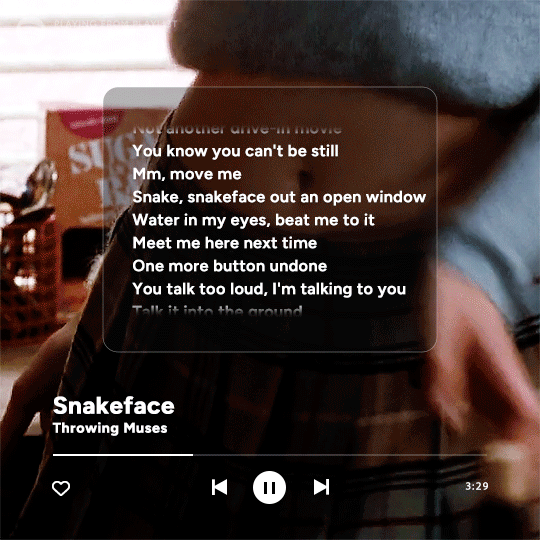
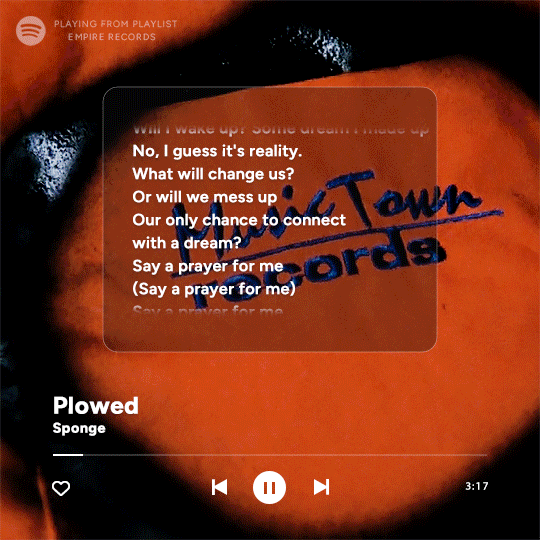
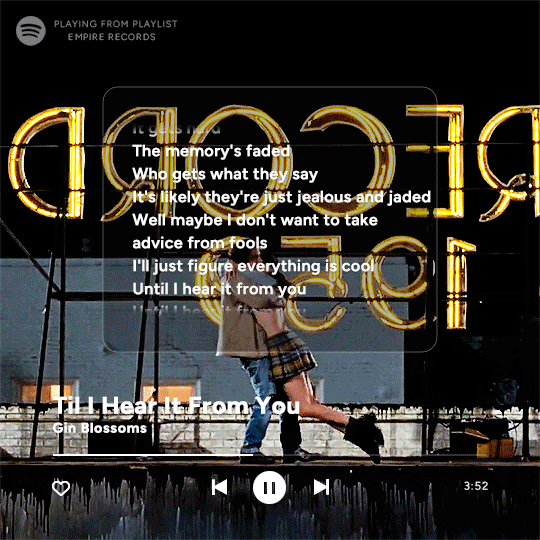
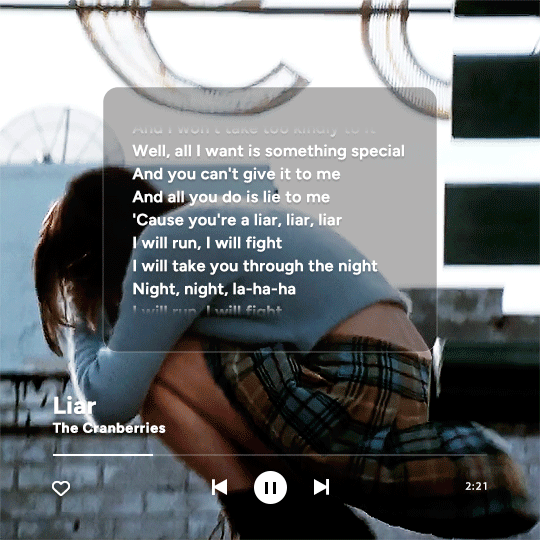
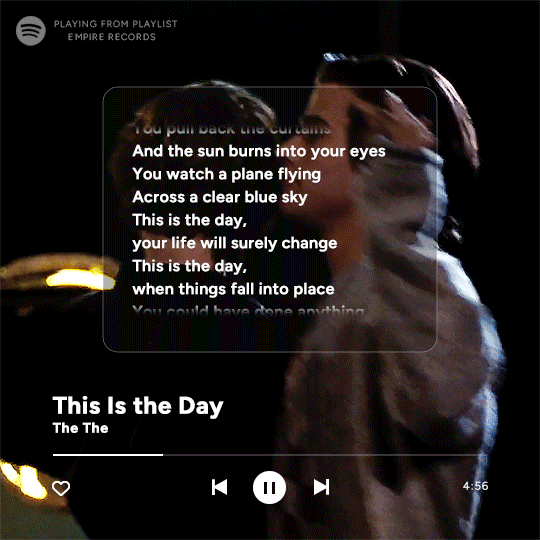
empire records + soundtrack spotify template by @uservalerian
244 notes
·
View notes
Text
tuesday again 8/13/2024
i think i'm going to take a break from scifi written by men for a bit
listening
Ahmed Malek's Les Vacances de L'inspecteur Tahar, from the 1972 film of the same name.
if i can be really really real for a minute here the only thing i've listened to more than twice this week is GUESS by charli xcx but i don't want to have the same tuesdaysong twice in a row. this would make for an annoying end of year playlist.
i got an ad for a collected set of Ahmed Malek's Algerian jazz music on instagram. a session musician in Algiers, he made his name as a soundtrack composer with this comedic detective movie and was in demand for the rest of his life-- he's still really beloved in the African jazz scene, his works are super collectible, and his daughter gifted all his masters to a tiny record company so they could rerelease and preserve them.
it sounds exactly how you think a 70s cop movie should sound. impeccable example of the genre. instantly evocative. i wonder if it influenced the wider cop drama soundscape or if it's just an early example?
-
reading
many books disappointed me a great deal this week.
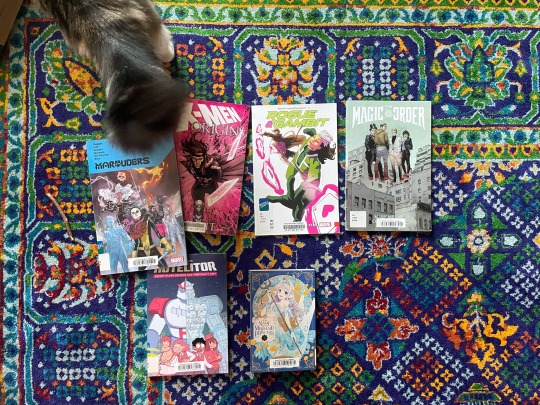
thank you philip.
the only comic i did like was Marauders (2019-2022), trying to get a little bit more into the xmen since my bestie has decided we're watching all their movies. this is really fun bc i knew who kitty pryde was, and she's a privateer captain who looks beat to shit the whole book. extremely fun and gay and swashbuckling, i placed holds for the other volumes already.
the two rogue and gambit books assumed i knew more about those characters than i already did, and had a heavy reliance on flashbacks and references to other issues.
the magic order was insufferable and did not stick its landing. made me worry about the characters and then feel really fucking stupid for worrying about the characters. i don't know why i keep trying mark millar books and thinking i will like them.
HOTELITOR had a very fun concept (mech hotel), but was a little more middle-grade than i was expecting, even from a teen book. very calarts visual style. very power of friendship will undo an evil corporation, which, i wish.
this little mermaid manga was not for me. and that's fine. most manga isn't for me.
we have to take a brief detour into how i store my books (poorly). these big middle shelves hold an unsorted mass, mostly of stuff i'm not sure i want to keep. i'm trying to be more thoughtful about which books i keep bc realistically i do not reread very often (if at all) and i am running out of space. as much as i love weird little scifi and fantasy paperbacks it would be cool if they all fit on one shelf.
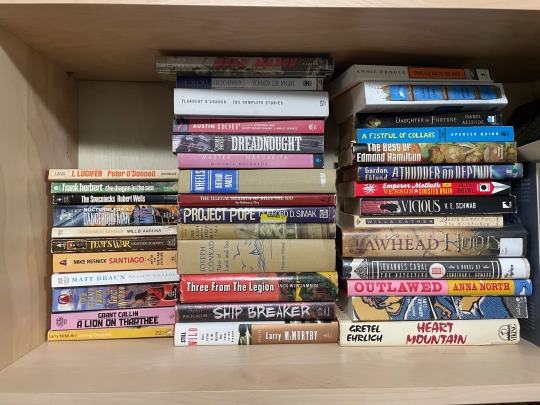
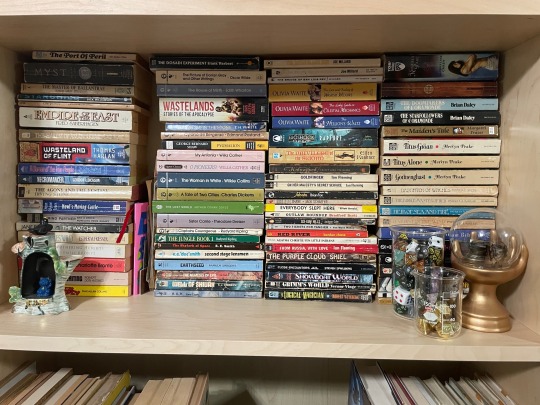
here are four books i rapidly cycled through this weekend that are going to be donated.
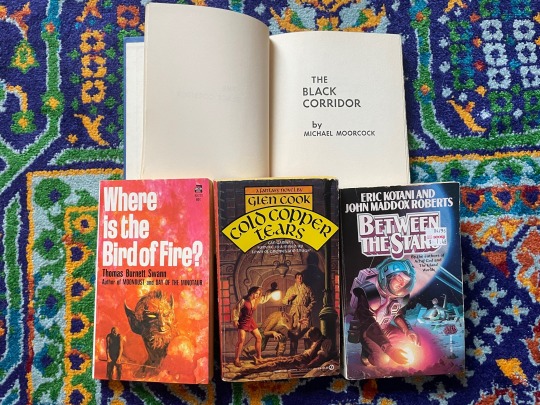
Michael Moorcock's The Black Corridor, 1969, about a man slowly going insane in a spaceship fleeing a politically violent Earth with his friends and relations in cryosleep. not a very beloved Moorcock book among the Moorcock fans. this has a heavy focus on the rise of British fascism and i'm not now, nor will i ever be, in the mood for this. a shame bc this slim hardcover has proportions that were very nice to hold.
Thomas Burnett Swan's Where is the Bird of Fire?, 1970, three not quite short stories but not quite novellas about mythical creatures at the founding of Rome, Xerxes the Great's empire, and Britain near the fall of Rome. states very clearly exactly what it is on the tin and delivers it, unfortunately i don’t like any of the flavors on offer. every single one of these has the half-coy kind of sex scene common in historical fiction, where in order to represent the past accurately and with full verisimilitude we Must convey that they fucked nasty and had fun doing it. many times. unfortunately a middle aged man wrote these and our erotic sensibilities are Very far apart.
Glen Cook's Cold Copper Tears, 1988, a noirish urban fantasy. there are fourteen books in this series so clearly people like them. i found a lot of the Noir Similes a little tortured. "but kay isn't that the point--" yes but these annoyed me. also there's a rape joke i didn't enjoy on the fourth fucking page. i have very few hard outs in fiction and one of them is on-screen or on-page sexual assault or rape jokes in chapter one. i am slightly less likely to drop a book if it has rape jokes in chapters that are not the first but like. it’s still almost a flat line at 100%.
and the only one i got two-thirds of the way through, and which i partially liveblogged here,
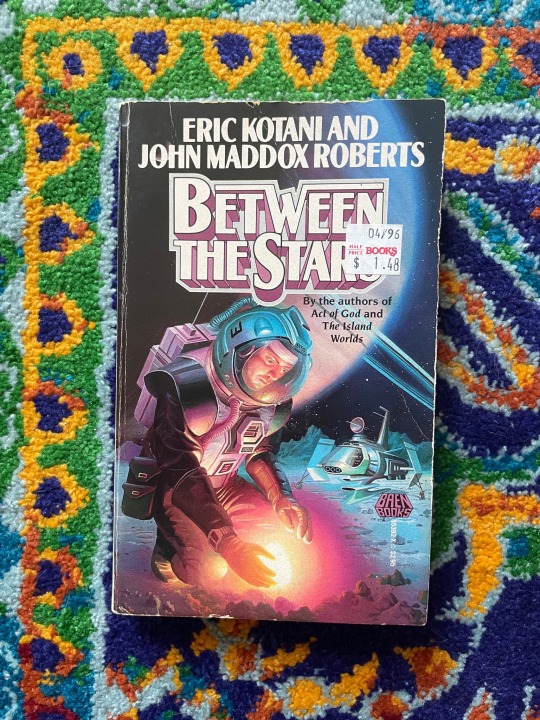
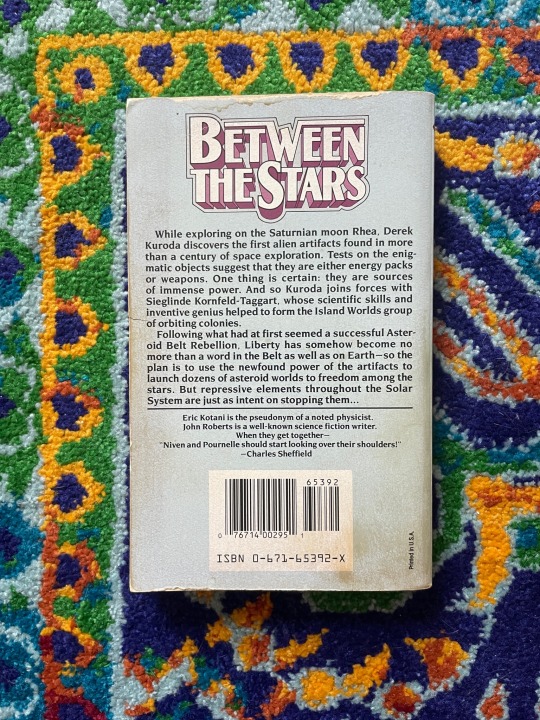
Eric Kotani and John Maddox Robert's Between the Stars, 1988, the third in their Island Worlds series. it stands alone fairly well, which is impressive.
this book is good at differentiating a very large, very clannish cast, which is a hard thing to do in a political opera. people are often differentiated by little physical movement quirks, which a spy later uses to identify someone. it’s a lovely bit of business and definitely the authors’ strong points.
also props for two of the most capable people, an ill-liked matriarch/scientific genius and a femme fatale Russian, for being two of the most interesting characters with the most screen time, both on their own and in other character’s thoughts. unfortunately, with such a large cast and so many factions, the action is often split and meandering. racist in the very specific orientalist way cyberpunk eighties fiction often is, but uncommonly, they remembered Turkey existed and included in the orientalism?
severely suffered from a second act where it tripped over its own feet a lot instead of continued forward motion, quite honestly i got bored and tired of being hit over the head with various points. a very whedonesque quality of needing to comment on the political implication of something the instant after it happens.
this is not a subtle book, and it smacks less of an urgency to get a point across in as few words as possible and more an uncertainty in the authors of getting their point across at all. this is confusing to me bc this was their fourth book together and the third in this series. have some more confidence in your writing abilities. like, if you've already established your baddie as a fascist torturer who literally owns slaves and plans on taking over earth, you don't need to have him also say "Hitler was much-maligned" at a dinner party he's holding in a room full of hunting trophies where the only things on the table are red wine and whole game birds. you've more than established him as evil. the whole book is like this. it's exhausting.
not a book for me! many such cases!
-
watching
my brother was really singing the praises of vampire hunter d's animation and i was like, postapoc roaming vampire bounty hunter? say less! im already getting in!
i watched the 1980s version with some bemusement until he was like "why did you watch that and not the 2000 version." well that would have been so cool of you to be more specific, my boy!!! vampire hunter d (1985, dir. Toyoo Ashida) was still fun but clearly had way less of a budget than Vampire Hunter D Bloodlust (2000, dir. Yoshiaki Kawajiri)
youtube
youtube
i enjoyed bloodlust a little more bc it had a postapoc style i enjoyed a little more: showed me big manta rays that hide under the sand, big ruined radio dishes, and lots of beautifully ruined skyscrapers and fucked up highway overpasses. every time you see me post about a BIG!!! FUCKING!!! DISH!!! you should hear this schoolchildren "YAAAAAY!" sample from Jet Set Radio
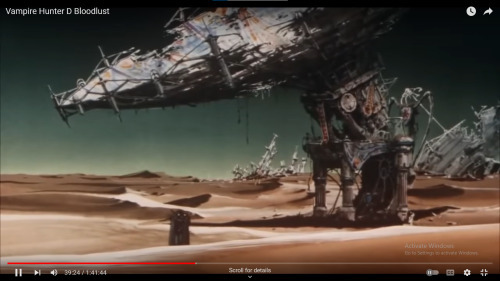
youtube
-
playing
nothing much to report, a lot of grindy genshin impact shit as i try to clear all my map markers before the new nation drops at the end of the month.
-
making
the girls have three litter boxes available to them (laundry room/spare bathroom/utility closet), all in the correct and recommended locations, all with good sightlines and escape routes and all out of the main hustle and bustle of the apartment, all open top, all with the same kind of litter and the same kind of litter mat. they only use the one in my laundry room. since phil has had free roam of the house she has not used the one in the office bathroom. i asked my vet about this and sent her pictures to make sure i was doing everything right and the diagnosis was "yeah that's a little weird of them". can we spread the wear and tear out a little more, girls? so i don't have to deep clean the same litterbox every week?
24 notes
·
View notes
Text
The Music of Jedi: Survivor
Last night I went to the Grammy Museum for an event celebrating the Jedi: Survivor score! Sometimes living in Los Angeles has its benefits. It was an evening with composers Stephen Barton and Gordy Haab, as well as their recording engineer Alan Meyerson, moderated by Jon Burlingame. I took copious notes throughout so I could share them with you all :) All quotes are paraphrases, I’m not that quick a note taker.


My husband and I settled into our seats, me vibrating with excitement as the lights dimmd. I was already hyped to hear the composers talk about my favorite game and their process for scoring it, but then my jaw fell out of my head because who strolled up on stage but fucking Cal Kestis himself, Cameron Monaghan, unexpected and uncredited on the event description.

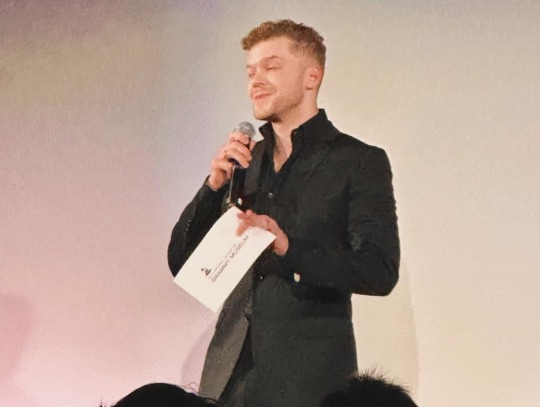
I almost rolled out of my chair. Then I frantically started smacking my husband (who’s never played the game, but loves music and production) and hissing “it’s him it’s him it’s the Jedi!!!”
Cameron’s intro was brief but lovely. He introduced himself, then paused and said something like, “Do you hear that? That’s the sound of silence. That is awful. I can hear my own thoughts! No one wants to play a game like that. Which is why we have these guys!” He introduced the composers, Stephen and Gordy, as well as the sound engineer Alan and the moderator for the event, shook their hands and exchanged some hugs, then sat down in the audience. Giddily I returned to my notes as Jon led the discussion.
Q: How did you get into scoring video games?
Stephen was a gamer and had always been interested in working with video games. They were “enticing” and the schedule was much more appealing than for TV, where you might be handed a script and told to get the music back in a few days.
Gordy hadn’t worked particularly in games before.
Alan has been mixing and engineering video game soundtracks for the past 25 years, like Gears of War.
Q: What’s the difference between scoring a film and scoring a video game?
For film, it’s adding music onto what already exists; often the composer isn’t involved until the last 6 weeks or so of production. (Fun fact I learned earlier this year, Ludwig Goransson was involved from the start on Oppenheimer because Christopher Nolan specifically wanted to subvert that.)
The film is fairly static by the time the composers get their hands on it, so things are unlikely to change.
Video games are more like trying to put clothes on someone running a race, because drastic changes can happen at any time. The timeline is also greatly extended — 2-3 years is common — so things may evolve and shift drastically in that time.
Film is also much less volume of music… they wrote an entire 8 hours!
Q: Is there a Star Wars music “house” style?
Initially Star Wars projects outside of the original trilogy were often scored as if they were B sides to the original soundtrack. But the aesthetic is evolving. There are a few standards though — there must always be that symphonic scale.
The score was performed at Abbey Road. Alan mentioned that he was actually there on 9/11 working on a movie about a terrorist attack. Stephen loves recording at Abbey Road so much he and his wife named his daughter Abbey. All three of them agreed that Abbey Road is magical and the orchestra practically blends itself; for choral performances, all you have to do is stick a couple microphones in there and they sound fantastic.
They played a clip of “Dark Times,” with gameplay footage intercut with the symphony performing at Abbey Road. They explained that they wanted to develop a new theme for the Empire. At this time, the Empire just is. You can’t use the Imperial March, because the Imperial March is how the Empire perceives itself. But how does Cal see the Empire? It’s dark and ominous. It’s everywhere. It’s a fact of life.
Gordy explained that they literally shaped the melody like the sinus rhythm of a heartbeat to indicate that Cal’s on the run, his heart always pounding, never safe. They used a full 12 tone chromatic scale to keep the track always uncomfortable and unsettled.
Stephen is such a Merrical shipper! He talked about how one of the central conflicts of Survivor is Cal struggling with his feelings towards Merrin, and what do you do when you’ve utterly lost the fight? He pointed out what the Senator tells Cal, and calls him a pretty reasonable guy. Do you stop fighting when you’ve clearly lost? “Maybe Cal should go shack up with Merrin somewhere and have a nice life.”
Q: What is it like having so much funding for the score on a game like this?
All you can really sell now is quality, and people expect it now.
Q: What is the process like?
They are brought into the game in the script phase, where they may see some concept art and get to read the script to help determine the story beats.
The collaboration is joyful! It seems like it could be really scary, to have game play testers, the game designers, and other music folks all weighing in on how the score is working or not working, but they actually really enjoyed it. They’ll usually do about half the music, then have people test play it for a few months, come back with notes, and then work on the remainder after seeing what worked and what didn’t.
They played “Flight” in its entirety with gameplay of Cal and Merrin outrunning the Trident, and talked extensively about our girl Merrin! Stephen talked about how in JFO, Merrin was important but not as big of a player. Now in Jedi: Survivor, Merrin is vital,and we can see her story arc take shape. Her small motif in JFO was expanded into an epic, heroic scale after we see her power with portals and moving on the wind. They reached for all kinds of wind instruments, from Alpine horns, Tibetan horns, and even the “most tasteful vuvuzela ever.”
Note: it’s almost as heart-pounding to watch that sequence on the big screen as it is to play it!
They both said that some music flows onto the page and is easy to write; the escape from Jedha sequence was not one of those! It wasn’t easy to write, mix or play! A hundred people worked on this song, and it was hard as hell. The orchestra musicians kept coming up to Alan and telling him they loved playing it because it was such a challenge.
They don’t always tell the studio who wrote what. They work well together as they both love bourbon and coffee! Stephen says he’s great at about ¾ of the tune but not the ending, whereas Gordy can fix that up in a jiffy. They also sometimes divvied things up by planet or emotional beats.
Q: I noticed in this last song (“Flight”) there was a choral element. How do you decide when to incorporate choir instead of synth choir?
Choir is often the first casualty of budget cuts since it’s so many people involved. Sometimes, synth choir is chosen for just a vibe or an extra layer.
However, there’s a rule that in musicals when the emotion is building to a point that words can no longer contain them, that’s when a character must burst into song. For a score, when the emotion is swelling and can no longer be contained by mere instruments, that is when to pull out the choir. So we see it in “Flight.”
Me: We also see it in “Rage,” muahahaha.
They used 120 singers for Flight and only needed 3 microphones because of how good Abbey Road sounds.
They prefer amateur choirs to session professionals since you can sometimes have too-professional singers trying to out-sing each other, and amateurs are usually more relaxed.
Q: There were a number of unusual or even invented instruments used for this score, tell us about them.
Gordy made bottle chimes. He accidentally dropped a bottle of water while playing tennis and a ball pinged off it, making a lovely sound. He ordered 20 metal water bottles and strung them in a wardrobe rack with different amounts of water in them. Because it took ages to make, they used it in loads of places in the score.
Stephen went nuts and ordered 200 containers of BlueTack for the pianos for Koboh. They wanted Koboh to sound like the old West, but not that spaghetti Western honkytonk piano sound. If you make BlueTack into a sausage shape and roll it around a piano string you can make it make these strange broken sounds sort of like a gamelan. This is called a prepared piano. The low bumbumbum noises when first getting on Koboh and meeting the pit droid? Freaking piano. I would have never guessed! They did this to 3 pianos.
They played a clip of Where the Nekkos Roam. They used the prepared pianos, an orchestra, dulcimers, Basset horns, euphoniums, tubas. They wanted Koboh to feel lived in and to have history expressed in the music. The musicians were excited to have to rent out Basset horns since like nobody actually owns one.
Q: Tell us about the cantina music.
The original cantina brief from George Lucas to John Williams was apparently, “what if aliens came down in 1000 years and found sheet music from Benny Goodman, but didn’t have the same instruments?” And thus we got the Mos Eisley cantina theme which is almost unbeatable.
They were thinking of scoring the cantina music themselves, but then thought, “what if we gave that brief to a bunch of really cool bands?”
They highly recommended Dan Mayo from Tantran. They recommended taking a few hours to watch him kick ass on the drums on YouTube.
Tantran recorded "Fields of Dusk" for the cantina first, then Stig came back and said “what if we wove this into the score? What if it was Cal and Merrin’s love theme?” Then they created a symphonic version, also partially inspired by a Joni Mitchell song.
They played part of the cantina version of “Fields of Dusk,” then they played the symphonic version with Cal and Merrin riding the spamel to Cere’s base. They gushed about being able to work with the story and the subtext.
Alan said that "Fields of Dusk” “is visceral. It vibrates shit inside of you. Mixing it was a highly emotional experience for me. Even now sitting under the subwoofer — it’s right here, over my head — it’s very emotional.”
Q: How many motifs do you have?
“Seven thousand.” - Stephen
Gordy later amended that to about two dozen, but with tons of variations.
Q: What are the interactions like with the game developers?
They get to be in the building with them, working on the narrative team — making sure to serve the story first. It also lets them practice gameplay or watch others playing to see how it flows.
Again, it’s a 2-3 year process.
They played the clip of Cal and Merrin making a campfire in the cave on Jedha. Stephen is all about the Merrical ship (not that he used those words, alas, but still)! He said this was such gorgeous writing, really allowing the technology to showcase the acting, and it’s his all time favorite scene in the game.
The whole theater clapped as he said that. Yes! A whole theater clapping while someone was talking about Merrical and calling it gorgeous. *sobbing forever*
Q: What has it been like to meet fans?
They’ve been delighted by the fans and how much they love the characters and the amazing performances of all the actors in the game.
Q: Are there plans for a sequel?
Stephen: “Are there Lucasfilm snipers out there? Look for the red dot…”
Gordy: “There’s not NOT plans.”
Fan questions!
Alan mentioned he loves doing the hardest piece first! Then it’s all skiing downhill.
A fan asked about more weird created instruments.
They also used a bunch of bamboo smacking other pieces of bamboo, as well as using little drums from other purposes or sets.
Was there anything they messed up or wanted to do differently than they did in JFO?
They accidentally didn’t loop music in the hangar on Zeffo, so if you stick around there for more than 3 minutes, it just becomes wind sound and gets very lonely. A live streamer was playing the game, talked to his audience for like 10 minutes, then wandered around almost in silence as his fans commented “why is this game so quiet?”
Gordy wanted to make JFO sound much darker and got his wish in Survivor.
I had so been hoping they would talk about “Rage” and the struggle with the dark side, but they were sort of avoiding spoilers. So when they got to the Q&A I had to speak up.
I asked, “What was it like working with darker themes later in the game, like with Rage? You see a real shift in the motifs and there’s also more amazing choral work.” Their faces seriously lit up XD
Stephen said this was one he handed to Gordy because it was very difficult.
Gordy said that this is Cal at his worst, so it had to be so over the top. Think of consonant sounds crashing through the melody, Cal trying to keep control of his thoughts but they’re twisting away, he’s trying to think straight and can’t. It’s discordant. It’s also scored to evoke a heartbeat throughout, like breathing.
It was so hard for the choir to do, going back and forth — you can’t do that with choral samples or synth!
They ended with a video they played from their Hollywood Bowl show in June, and said we were only the second group of people to see it. They played a clip where they do use the classic Imperial March, but contoured so you only get the silhouette of its shape, instead of the full sound. It ended with a clip of the Tantran band playing a wicked awesome set out in the desert. The last image they showed was a list of the 287 people who worked on the score!
We let out and I did get to meet them! Stephen was lovely and I told him it was just such a beautiful, haunting score. I actually had a sketch of the campfire scene with me and he signed it! His daughter Abbey is an artist too and she was really impressed by my sketchbook (she looked to be about 11). Gordy also got to see a bit of my sketchbook and signed Cal in Nova Garon! What an awesome night! We didn’t see Cameron again but I was so astounded to see him the first time I didn’t mind at all.
SO COOL! Sometimes, kids, living in Los Angeles isn’t so bad!!
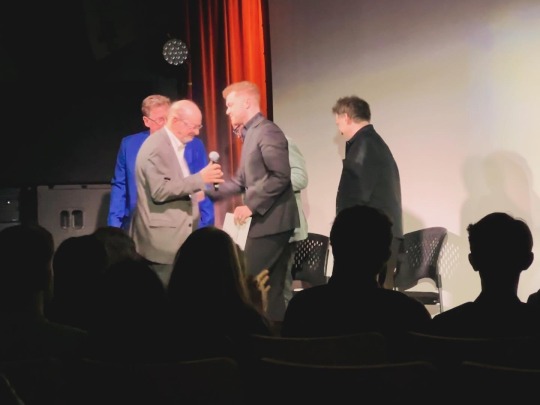
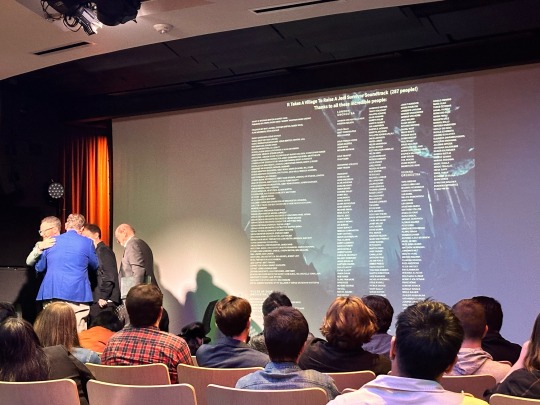


#jedi: survivor#cameron monaghan#cal kestis#gordy haab#stephen barton#alan meyerson#grammy museum#jedi survivor#jedi survivor spoilers#jedi: survivor spoilers#my jedi posts
97 notes
·
View notes
Text




Ghostbusters: Frozen Empire's soundtrack is available on vinyl for $50 via Waxwork Records. Shipping in November, the score is composed by Dario Marianelli (V for Vendetta, Bumblebee).
The 2xLP album is pressed on two color variants: Slimer and Frozen Empire. It's housed in a gatefold jacket with matte satin coating featuring art by JJ Harrison and a four-page booklet with liner notes from director Gil Kenan.
#ghostbusters frozen empire#ghostbusters#dario marianelli#ghostbusters: frozen empire#slimer#waxwork records#vinyl#soundtrack#gift#gil kenan#paul rudd#carrie coon#mckenna grace#finn wolfhard#frozen empire
12 notes
·
View notes
Text
LACUNA COIL Announces 'Sleepless Empire' Album, Shares New Single 'Oxygen'

Italian metal titans LACUNA COIL will release their tenth studio album, "Sleepless Empire" — their first collection of new songs since 2019's "Black Anima" — on February 14th, 2025 via Century Media Records. The official music video for the LP's latest single, "Oxygen", filmed in Latina and directed by Daniele Tofani, that shows singer Cristina Scabbia in the lead role, will make its online debut today at 9 a.m. PDT / 12 p.m. (noon) EDT.
Scabbia commented on the track and her experience filming the video: "'Oxygen' is a powerful exploration of emotional struggle and inner conflict. The lyrics convey a sense of drowning in a toxic environment, both literally (in the video) and metaphorically, where attempts at salvation, represented by 'oxygen' are somehow futile. This song encapsulates the feeling of struggling to break free from what holds us down, when the journey is filled with difficulty. It's a raw anthem of vulnerability, resilience, and the courage to face what seems insurmountable. Having to stay in the water for so many hours during the video shoot was cathartic for me, the realization that the pleasant sensation of floating could in an instant become dangerous and deadly if I wasn't careful was very fitting with the song's theme."
Inspiration to create "Sleepless Empire" came during the sessions for "Comalies XX" (2022),the acclaimed remake of LACUNA COIL's breakthrough third record "Comalies". Writing and recording took place in northern Italy between Milano (the band's hometown) and Como, where SPVN Studios are located. As with their previous albums, production was done in house with Marco "Maki" Coti Zelati at the helm, and artwork was hand curated by the talented Italian artist Roberto Toderico. Two other very special talents enrich the album, namely the guest vocalists: LAMB OF GOD's Randy Blythe on the song "Hosting The Shadow" and NEW YEARS DAY's Ash Costello on "In The Mean Time".
As a token of the band's love for the gaming world (which we've seen in past endeavors such as their card game "Horns Up" and their collaboration with Zombicide for which they wrote the track "Never Dawn"),the band have created an oracle "game" to be played with custom made dice available only in the box set version of "Sleepless Empire".
The new album is comprised of 11 tracks; each one is a richly textured soundtrack to a specific time and place. With "Sleepless Empire", that place is dark, cinematic, and unmistakably true to the unique characteristics that have given LACUNA COIL such a celebrated entry in the annals of heavy music.
The band shares: "'Sleepless Empire' captures, through our eyes, the chaos of a generation trapped in a digital world that never stops, where social media consumes identity and every day pushes us one step closer to becoming soulless zombies. We find ourselves in between, having witnessed a full analogic world and the modern one, confronting the evolution and searching for a true meaning of it all. Throughout every song, the journey is an undercurrent of rebellion, a desperate cry to reclaim oneself in an era that seems to have lost its sense of time and reality."
"Sleepless Empire" track listing. 01. The Siege. 02. Oxygen. 03. Scarecrow. 04. Gravity. 05. I Wish You Were Dead. 06. Hosting The Shadow (feat. Randy Blythe). 07. In Nomine Patris. 08. Sleepless Empire. 09. Sleep Paralysis. 10. In The Mean Time (feat. Ash Costello). 11. Never Dawn
Later this month, LACUNA COIL will embark on a tour of U.K. and Ireland with Finland's BLIND CHANNEL. Tickets are available here.
LACUNA COIL played its first concert with the band's new touring guitarist — whose name has not yet been disclosed — on August 4 at the Rockstadt Extreme Fest in Râșnov, Romania.
This past June, LACUNA COIL announced the departure of guitarist Diego Cavallotti.
Cavallotti, who joined LACUNA COIL in 2016, initially as a fill-in guitarist following the exit of Marco "Maus" Biazzi, later said in a social media post that "this decision is not the result of my dissatisfaction or desire to explore new opportunities."
When LACUNA COIL announced Cavallotti's departure on June 17, the band wrote in a statement: "As we step into a new cycle, writing and recording our next album, we are parting ways with Diego 'DD' Cavallotti. We thank him for the many unforgettable moments shared over the years and wish him the best of luck in his future endeavours."
All future live plans remain unchanged and the new songs are taking form, we can't wait to share them with our fans."
LACUNA COIL recently completed the "Ignite The Fire" U.S. tour with support from NEW YEARS DAY and OCEANS OF SLUMBER.
"Comalies XX" was made available on October 14, 2022 via Century Media Records.
LACUNA COIL celebrated the 20th anniversary of "Comalies", by performing it in its entirety at a one-night-only concert on October 15, 2022 at Fabrique in Milano.
"Comalies" was originally released on October 29, 2002 through Century Media Records. The LP, which featured the band's breakthrough single "Heaven's A Lie", has reportedly gone on to sell over 300,000 copies in the United States alone.
Photo credit: Cunene
14 notes
·
View notes
Text







IG: @/sarah.elise.bauman
Over the past month or so I’ve been working on lumen prints incorporating some of my favourite CDs in my collection.
The CDs and accompanying booklets in these prints (as shown in order) include:
1) Y2K Beat the Clock compilation CD (including songs by Bjork, The Prodigy, Underworld and more)
2) Live Through This - Hole
3) Evol - Sonic Youth
4) May I Sing With Me - Yo La Tengo
5) Empire Records movie soundtrack
6) I Care Because You Do - Aphex Twin
7) Long Days Ride ‘Till Tomorrow - Eric’s Trip compilation
Video features detailed close up shots from the prints.
#mine#lumen print#analog#courtney love#aphex twin#empire records#bjork#yo la tengo#sonic youth#kim gordon
7 notes
·
View notes